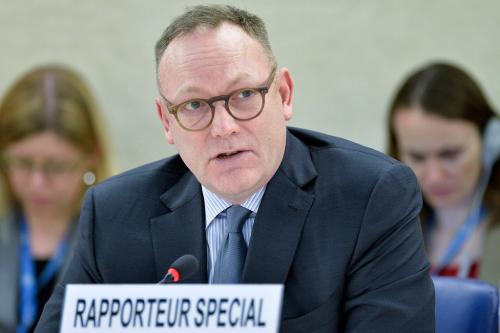Human rights and counter-terrorism must go hand-in-hand, say UN experts
Only through a strict adherence to international human rights standards can the world’s counter-terrorism strategies ultimately succeed, two United Nations human rights experts have declared.

Special Rapporteur on the promotion and protection of human rights and fundamental freedoms while countering terrorism Ben Emmerson.
“Just as much as we condemn terrorism, particularly at a time when the international community reaffirms its unreserved commitment to combat it, we must demand that human rights be respected in the context of such a challenge,” said Ben Emmerson, the UN Special Rapporteur on the promotion and protection of human rights and fundamental freedoms while countering terrorism, and the UN Special Rapporteur on religious freedom, Heiner Bielefeldt, in a press release issued on 16 April, 2015.
Pointing to the recent terrorist attack against Kenya’s Garissa University College in which at least 147 students and lecturers were killed, the two experts said the incident once again showed the “urgent need to re-think counter-terrorism responses based on law enforcement and military force,” adding that Member States needed to confront the non-religious driving forces of terrorism “more seriously.”
“This is particularly true when confronting challenges such as armed conflict, poor governance, environmental degradation, endemic corruptions, intricate historic legacies of a country, extreme poverty, social, cultural, economic and political discrimination, as well as marginalization of large sections of the population, or prolonged periods of State collapse.”
These circumstances, the experts continued, provide “a fertile soil for recruitment” for extremist movements that promise a prospect for change from the status quo but then resort to “unacceptable means” of acts of terrorism to achieve their goals.
“By actively promoting and protecting human rights, States contribute to preventing terrorism in an effort to address its root causes and risk factors,” Mr. Emmerson and Mr. Bielefeldt added. “This is not solely a question of legitimacy; it is also a question of effective prevention.”
In the press release, the UN experts also suggested that Member States recognize the suffering of victims of terrorist acts and accept “a special obligation” to victims of terrorism occurring on their territory. However, they warned, the suffering of victims should never be misused as a pretext to deny the human rights of those suspected of terrorism.
“This adds to the vicious circle of terrorism by contributing to the dehumanization of victims of terrorism,” the independent experts concluded. “Genuine respect for the humanity of the victims requires that the protection of human rights is not invoked to curtail human rights.”
To that point, they said, Member States should move towards the adoption of a specific international instrument setting out the rights of victims of terrorism and the corresponding obligations on States.
Source: United Nations
- 334 reads
Human Rights
Fostering a More Humane World: The 28th Eurasian Economic Summi

Conscience, Hope, and Action: Keys to Global Peace and Sustainability

Ringing FOWPAL’s Peace Bell for the World:Nobel Peace Prize Laureates’ Visions and Actions

Protecting the World’s Cultural Diversity for a Sustainable Future

Puppet Show I International Friendship Day 2020

